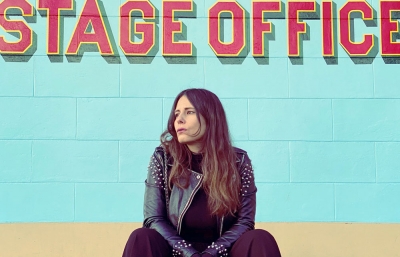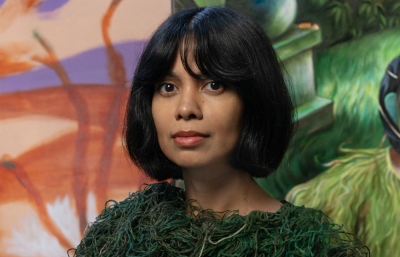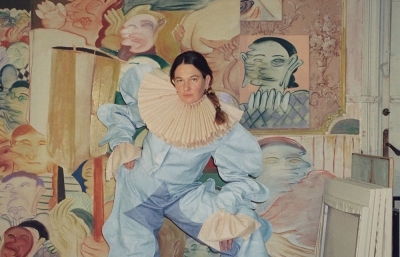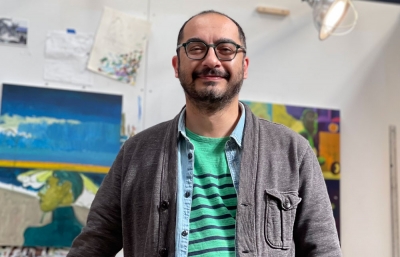
Trent Reznor and Atticus Ross
Friday is the new tuesday, except it's not
Interview by Mike Stalter
A little over two years ago, the powers that be changed a decades-old system of releasing new music on Tuesdays in the United States in an attempt to thwart illegal downloading for those who couldn’t wait for the music to be available. In the digital era, new music could be purchased elsewhere in the world and uploaded to the web, creating a chaotic system for record producers to keep any sort of handle on distribution to U.S. consumers. They struck a new deal to release all new music on Fridays.
Problem is, when I embark on my discovery mission to find new and interesting music, I’m constantly disappointed to find that the majority of releases are nothing more than singles, not albums. Access and immediacy are two great advantages of a digital world, but aren’t as beneficial for musicians trying to hold the attention span of fans and potential new followers. The era of the album, the complete work, feels like it’s spun out of existence.
Trent Reznor is trying to change that, and after recently sitting down with him and bandmate Atticus Ross in Trent’s L.A. home, I felt inspired by his vision to bring back the ritual. You know, that thing you used to do where you stopped the other things you were doing to briefly go on a little journey with your favorite band. It’s more than the music. It’s the entire package that matters to Trent and his band, Nine Inch Nails, something they have presented exceptionally well for almost thirty years.

Mike Stalter: Over the years, you’ve cited influences like KISS, Depeche Mode, and David Bowie. How did their presentations, not just the music, but the visual elements of the live performances, album covers, and liner notes shape how you present Trent Reznor, and consequently, Nine Inch Nails?
Trent Reznor: Growing up in cultural isolation made me focus on what I wanted to do. I learned internally that playing music and expressing myself through music felt like a connection to my soul, and it made me feel good about myself. It felt like I tapped into something I needed to pursue.
I had a fairly mainstream, FM pipeline of music, but when I did find those influences at whatever age, they really resonated. For example, with a KISS album, my friends and I would pore over every clue that was on the physical thing. I didn't know what they sounded like talking, because they weren't on TV and there wasn't internet. Limited access allowed you, the fan, to fill in the blanks, and the artists became who you thought they were. I started really trying to absorb the music and artists via their album covers, the liner notes, whatever bits of information, because again, you didn't have that much information.
I think it created a climate where the music was allowed to fulfill a bigger role than it appears to have today. Since I wasn't bombarded with too much information about the band, it didn't feel as much like marketing. There wasn't social media, where I could see what salad Gene Simmons was eating, then immediately find out he was an asshole. It took me years to figure that out.
You recently contributed music to the Walled Off Hotel project that Banksy put together in Palestine. What was that experience like?
Atticus Ross: I went to art school a long time ago, and everyone went different directions from there. About a month before the hotel opened, I got a call from a friend, who’s a friend of Banksy, and was asked, "Would you guys be interested in doing this thing?" and they explained what it was. I asked Trent, who’s also a huge fan of Banksy, so, of course, we said yes.
TR: We heard the rough framework, which didn’t include a lot of details, and then we just started working. It felt like we over-delivered on the expectation, and it turned into something else. It was all cool, though.

Over the years, there's been a cohesive aesthetic and textural imagery in your album art and videos, which fans have come to expect. But then, when you get to 2007’s Year Zero, there's a recognizable change in this militant propaganda-style imagery, such as, “Art is resistance, art is action without violence.”
TR: Year Zero was the biggest shift, in a number of ways, including how we wrote together. We were bored on tour, and decided to make an album embracing minimalism. In this case, we were on the bus, on a laptop. Today, that's not a big deal, but at the time, laptops had just become a viable, pretty much uncompromised way of making music. Instead of being in a room with guitars and everything around, we had some kind of primitive plugins and the ability to chop up audio. So we said, "Let's see what happens only using that.“
It wound up being wildly, musically exciting. We started talking, and were pretty worked up about what was happening politically for the first time in our lives, I think. The Bush administration seems quaint in comparison, but at the time, we felt like, "Man, this is madness. What would have happened if this kept on?” That became the premise: telling a story in fiction, set as a series of snapshots, and how we could actually tell that story. I didn’t want the songs to be a narrative journey that hit you on the head as obvious.
If those were just little snapshots, how could we tell the story through the artwork and the supportive material around it? Yeah, we could have done a graphic novel or writen elaborate liner notes, because people still bought albums or CDs in those days. That's when we started thinking we should do something different. We were blown away by what 42 Entertainment had done with other artists, this really inventive way of telling a story that utilized multimedia and current technology. It became a partial scavenger hunt. It spilled between fiction and reality in a way that we found really compelling.
.jpg)
On the new EP, Add Violence, you've got this extraordinary album image: the machine, with labels and knobs covering the breadth of human emotion, is laid out from the top down. In the notes on the website, you mention the importance of vinyl and the interaction it demands from the listener, and how it’s about the ritual.
TR: With a physical album, aside from touching it, feeling it, smelling it, there's another factor that I realized; I've got to figure out where it's going to sit on the shelf. When I walk past all my vinyl, I'll often look and think, "Oh, there's that so-and-so record." I'm reminded of it. It's in the world with me, like something on my desk. It doesn't just disappear in the clouds, or on some fucking app somewhere. It's a thing. The next time I move, if I move, I'm going to have to figure out what to do with it, do I want it anymore? It's a thing living with me.
In a recent interview, you mentioned seeing through the eyes of a father, and worrying about what's happening in the world. Artists and musicians have historically made political statements about what's going on in the world. Have musicians stopped being political?
TR: I can't speak to the motivations of pop artists. I just read a couple of artists, popular indie artists, talking about their concern about think-piece culture, and how they fit into a think piece, and maybe that they shouldn't make music now, because of a real concern about what people, journalists, and bloggers think of them.
Imagine if you're a product of that culture, you've been created because you've emerged from a blog culture that is think-piece driven. You're going to be much more concerned about making sure that this “thing” that fed you still cares about you. It’s part of a bigger issue, of being too worried about what people think. In this social media crazed, “How many followers do you have?” world, everybody has an opinion. There’s a toxic world of online feedback. The ability for people to bitch at you, and complain about you, are greater than they've ever been. I think years ago, you might have just gotten letters, and didn't have a fire hose of people shitting on you all day. Now, at any moment, if you want to feel shitty, you are two buttons away from having someone tell you that you’re shitty. It's not good for you as a human being. It's certainly not good for you as an artist who might take chances and follow your own voice. You're not delivering their expectation of what you should be delivering. That's not to say you can't make shitty arguments, and certainly we all do from time to time, if not all the time, but tuning into that is the death of great art, in my opinion.

The ability as an artist to make money, and to make a living as a musical artist, to be heard, to make an impact, to have a record even be noticed, has shrunk. I think relying on the corporate sponsor, the benefactor, has become more important. We were just talking about how, in the early '90s, Sonic Youth would not be in a Taco Bell ad. That would have been the end of Sonic Youth. The equivalent of Sonic Youth today, they could be in a Taco Bell ad. They could be sponsored by any number of things that might be distasteful, but it’s also perceived as kind of okay.
It can also become a muzzle of expression, because now you might think, "Hmm, I don't know if I should say this, but do I really want to piss off the person that might be sponsoring the fucking tour?" We only have a few avenues of revenue and support. Maybe we don't want to risk pissing them off. I understand it, but I do think that perhaps it is contributing to a dangerous climate where fewer people are speaking up.
In the end, it always comes back to the storytelling. The music's vibe, art, video concept, all pieces of the story that you're trying to get across. Who would you consider to be good examples of this in 2017?
TR: I think the way Radiohead presents themselves builds authenticity. Their avoidance of social media and the scarcity of them doing press creates a tasteful presentation. It strengthens my impression of the music.

That brings a question I hadn’t planned on—Radiohead has consistently worked with Stanley Donwood. We recently interviewed Josh Homme and Boneface, who have worked together on two albums now. In your case, there’s a relationship with Russell Mills. Do you feel that such long-term associations with visual artists are important?
TR: There's been a part of me that wished there was a Stanley Donwood who grew up with us and was involved in the aesthetic decision making, and felt like another part of the band. For example, “This time we're going to focus more on electronics and the visuals are going to be more organic or more painterly, or more whatever it might be. “
Not having that role, it's been more like, "Let's find the right visuals for the record and let's find the right executor of those visuals." With Russell, it's always been a very pleasant experience. The reason to reach back to him was that I wanted it to feel familiar to that era. When we were doing Hesitation Marks, I wanted it to feel like a sibling of that record, visually. Then, the work that he started producing helped inform the rest of it. It was still in the state of flux, even compositionally. When I started seeing the work, it started making more sense to me. I wanted to it to belong there, so there was only one choice.
Nine Inch Nails newest EP, Add Violence, is now available via The Null Corporation.





